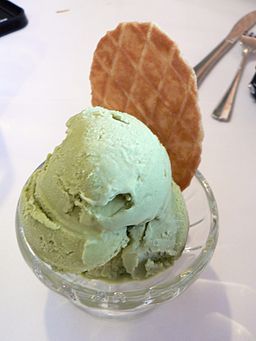Psychiatry
In Praise of Oddballs and Unexpected Flavors
How I ditched vanilla for green tea, and lived happily ever after.
Posted August 20, 2014
I have always told my kids that it’s good to be a little crazy. Crazy is INTERESTING, I remind them. I’ve had to say it to save face, because we are basically a family of oddballs.
There is a difference between eccentric and what some people colloquially call “crazy.” I never use the term “crazy” to define a person with any sort of significant psychiatric disorder; in my lexicon it only applies to people who are quirkily different, and is voiced fondly and with a sense of solidarity (see above).
Hey, those Crazies are my people.
In light of this, I've made it my mission to help my children avoid the old school-yard lie about popularity and “normalcy.” You know what I’m talking about, the lie that has suckled many generations of Queen Bees and bullies, and should be retired at once, before we all bully each other into perdition.
Yet, what do you call a person like my Benjy? He’s not eccentric. OK, he is, but that is not the alpha and omega of him. He's the kind of crazy you can’t call crazy, because his difference is entangled with so much pain, such perilous slant. His crazy is an infected sore; it hurts like hell if you mess with it. (I guess I should interject here and tell you that THOSE folks, whose differences are the stuff of firm-set scabs ripped off of knees, or nightmares of the worst order, are my people, too. And in full disclosure, I was so much like Ben, as a child, that I am sometimes shocked to find myself here at all.)
What I think I am saying is, just because Benjy has been known to don a pair of shorts, tall socks, and a turtleneck for the purpose of building a snowman in mid-winter, does not mean you can laugh at him, the way Saskia and I laugh at Lars when he mows the lawn in shorts, black crew socks, Birkenstocks, and whatever hat was easily accessible on his way out the door. Which would be even more funny if he was married to the woman next door.
Laughter can be fiendishly hard to decode. Giggles have been the undoing of many a tortured soul. For a kid like mine, who at eleven years and seven months of age told me he didn’t think he’d emerge long enough from his churning sea of despair to arrive safely on the shores of twelve (well, technically he said that he believed he’d take his life before his twelfth birthday), another person’s laughter can be a deathly serious matter.
Which leads me straight to the subject of words and what we assume they mean.
For a long time Lars, Saskia and I could not figure out "what" Benjy was. Who he was, we'd begun to suss out, but none of the diagnostic categories in current use quite made sense. He seemed to fall into a classification of his own—the young-male-full-of-empathy-and-emotional-expression-who-talks-unsparingly-and-who-knows-without-limit-the-most-arcane-and-specific-things-you-can-know-but-does-not-understand-how-to-tie-his-shoes-or-read-the-meaning-in-a-pair-of-rolled-eyes.
(To answer your unspoken query: yes, Asperger's Syndrome is part of this picture. And yes--so is a robust, if uneven, emotional intelligence. Add a large measure of severe psychiatric dysregulation to the pot, stir tentatively, then stand back and do what you’ve got to do to keep the universe from imploding on the family’s heads.)
But getting back to categories and definitions: the way the literature presented its catalogue of differences and the people who evidently inhabited them, was confusing to us. So was our every interaction with Ben. I mean, if a boy knows the difference between a Huey and a Chinook military helicopter, and which dinosaurs lived when and with whom, then shouldn't he also know how to use a toaster? If he consults earnestly with Tech Support on Tuesday evening and proceeds to conquer an insurgent computer glitch before bedtime, shouldn't he be able to lift his head and face the world, when his parent tries to rouse him Wednesday morning?
That is (or was) Ben, in a nutshell: breathtakingly intelligent, impressively empathic, and utterly disabled, all at once.The first two qualities are fast eclipsing the third these days. In any case, “disabled,” as a catch-phrase, has always been inadequate to describe our boy--and, I would imagine, every other "non-standard" human being. (Wait--wouldn't that be all of us?) Some folks are intensely abled at niche occupations or highly-focused fields of study, and less so at the things better valued and understood by the rest of us. Some people are “differently-abled.” Their gifts may come in the form of a deep capacity for kindness and love, rather than an aptitude for building houses or selling snake-oil or straightening teeth.
The subject of this short video is a virtuosic hugger.
“Disabled.” Mentally ill.” “Dumb. “Gifted.” “Behavioral.” “Funny.” Then there's the ol' one-two punch: “beautiful” and “ugly.” Think about it: what do any of those words actually mean? They mean nothing, because they mean everything. My beautiful is your ugly, and that other guy’s “meh.” Her concept of “mentally ill” comes straight out of Newtown and Columbine. Mine looks like a child panicked by a world that is too large, too noisy, and too hard to navigate. Depressed by daily bullying, or isolation. Or simply in thrall to his or her off-kilter brain chemistry. In my mind, a person struggling with psychiatric illness would rather not be. And is more likely to hurt herself than to hurt you or me.
THAT is the problem with words--and with the binary ways in which we structure our world. “Normal” vs “Disabled.” “Good” vs. “Bad.” “Pretty” vs “Ugly.” We need these relationships of either/or in order to feel comfortable in our own skins. All of us do--it’s human. And more important, we need to feel we have control over the universe. The “us and them” mentality seduces us into thinking we have that control. The cruel joke is: we don’t--with the binaries in place, or without them.
Whoever was given the task of scaffolding the Western world-view did a great job. Really, you did. But with all due respect, and with no agenda in mind except a human(e) one--maybe it’s time to put the binaries out to pasture?**
I have this creeping dread of those things. Because, along with their pretense of unitary meaning (hey, everyone knows the definitions of "smart" and "stupid," don't they?), I think they mean mischief. When we enshrine "normal" and "abnormal" as absolute, defensible categories, we can use normal to whomp abnormal on the head, and keep her dowm.
I LIKE abnormal. She's interesting. And these days I’m readier than ever to cast my lot with that young restaurateur, Tim, whose gift is making people feel comfortable, appreciated, and well fed.
Meatloaf, mashed potatoes, and a glass of merlot, served up with a warm embrace? OK, when? Now? Please??
Readers, let me frame things one last way: I would never have written this post if it weren't for Benjy. Instead I’d have spent weeks amongst the dead, silently researching and writing a dry-as-dust essay on some 19th-century poet’s use of blank verse as opposed to some 18th-century poet’s use of heroic couplets.
Thank you, Benjy, for saving me.
Welcoming you, with all your surprises, into our family was the best thing that ever happened to me. To push aside the dead poets in favor of a frozen confection metaphor, you helped me open myself to the possibility that ice cream could be consumed in flavors other than vanilla and chocolate.Those other flavors turned out to be more complex, more compelling--some of them much more flavorful--than the old duo.

Green tea ice cream? I am SO happy to have made your acquaintance!
Readers, what say you? Am I missing the point? Do binaries serve an important purpose for us as individuals and members of larger communities?
And the most important question of them all: Green Tea or Chubby Hubby? Or what?
**Except if you’re a computer. Or a robot. Carry on, robots; this does not concern you.
[[A quick note on things to come: starting next week I plan to focus more on the “what to expect” aspect of this blog. Not that there is only one set of answers--or that I have a magic pill stashed in my purse. But I’ve been around the block a few times. I’ve seen things I wish I hadn’t. And I’ve become pretty adept at ferreting out resources, advocating for my child with schools and clinical programs, and decoding subtle signs that a crisis is brewing. I plan to devote at least one post a week, moving forward, to sharing those things with you.]




